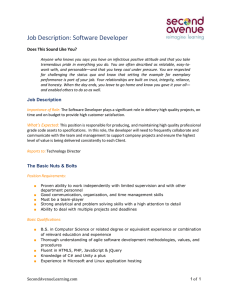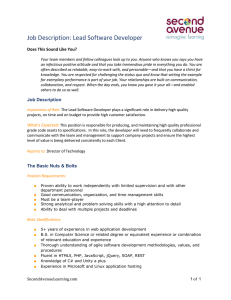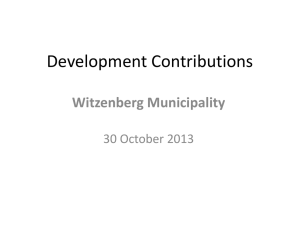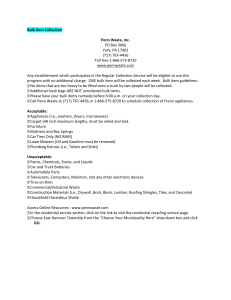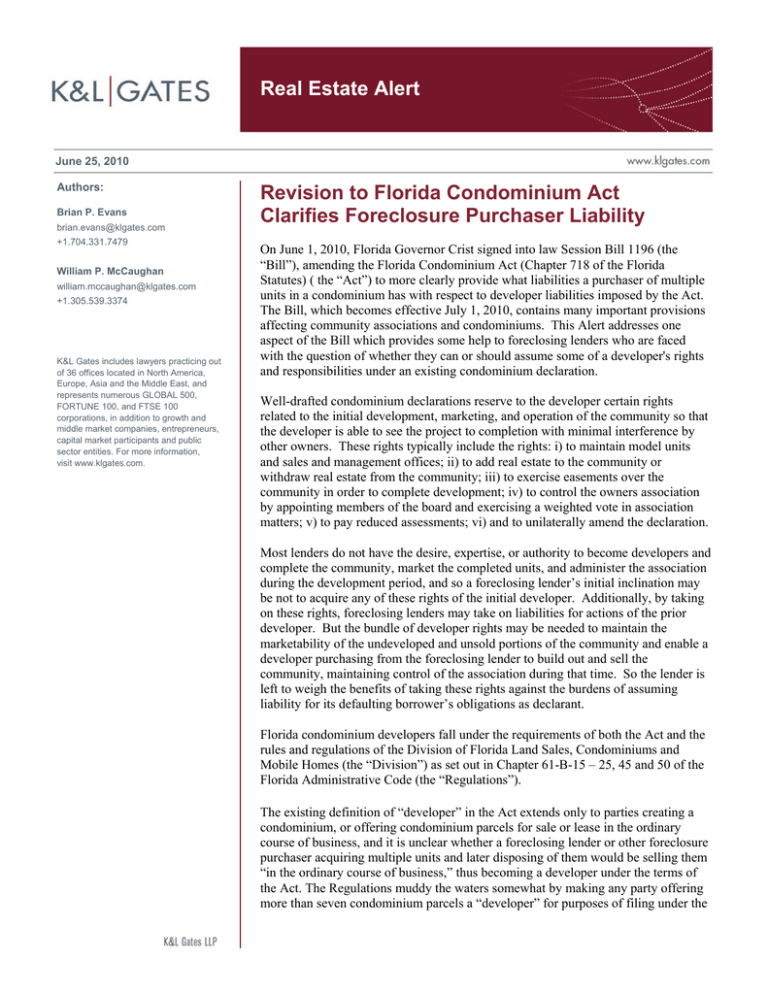
Real Estate Alert
June 25, 2010
Authors:
Brian P. Evans
brian.evans@klgates.com
+1.704.331.7479
William P. McCaughan
william.mccaughan@klgates.com
+1.305.539.3374
K&L Gates includes lawyers practicing out
of 36 offices located in North America,
Europe, Asia and the Middle East, and
represents numerous GLOBAL 500,
FORTUNE 100, and FTSE 100
corporations, in addition to growth and
middle market companies, entrepreneurs,
capital market participants and public
sector entities. For more information,
visit www.klgates.com.
Revision to Florida Condominium Act
Clarifies Foreclosure Purchaser Liability
On June 1, 2010, Florida Governor Crist signed into law Session Bill 1196 (the
“Bill”), amending the Florida Condominium Act (Chapter 718 of the Florida
Statutes) ( the “Act”) to more clearly provide what liabilities a purchaser of multiple
units in a condominium has with respect to developer liabilities imposed by the Act.
The Bill, which becomes effective July 1, 2010, contains many important provisions
affecting community associations and condominiums. This Alert addresses one
aspect of the Bill which provides some help to foreclosing lenders who are faced
with the question of whether they can or should assume some of a developer's rights
and responsibilities under an existing condominium declaration.
Well-drafted condominium declarations reserve to the developer certain rights
related to the initial development, marketing, and operation of the community so that
the developer is able to see the project to completion with minimal interference by
other owners. These rights typically include the rights: i) to maintain model units
and sales and management offices; ii) to add real estate to the community or
withdraw real estate from the community; iii) to exercise easements over the
community in order to complete development; iv) to control the owners association
by appointing members of the board and exercising a weighted vote in association
matters; v) to pay reduced assessments; vi) and to unilaterally amend the declaration.
Most lenders do not have the desire, expertise, or authority to become developers and
complete the community, market the completed units, and administer the association
during the development period, and so a foreclosing lender’s initial inclination may
be not to acquire any of these rights of the initial developer. Additionally, by taking
on these rights, foreclosing lenders may take on liabilities for actions of the prior
developer. But the bundle of developer rights may be needed to maintain the
marketability of the undeveloped and unsold portions of the community and enable a
developer purchasing from the foreclosing lender to build out and sell the
community, maintaining control of the association during that time. So the lender is
left to weigh the benefits of taking these rights against the burdens of assuming
liability for its defaulting borrower’s obligations as declarant.
Florida condominium developers fall under the requirements of both the Act and the
rules and regulations of the Division of Florida Land Sales, Condominiums and
Mobile Homes (the “Division”) as set out in Chapter 61-B-15 – 25, 45 and 50 of the
Florida Administrative Code (the “Regulations”).
The existing definition of “developer” in the Act extends only to parties creating a
condominium, or offering condominium parcels for sale or lease in the ordinary
course of business, and it is unclear whether a foreclosing lender or other foreclosure
purchaser acquiring multiple units and later disposing of them would be selling them
“in the ordinary course of business,” thus becoming a developer under the terms of
the Act. The Regulations muddy the waters somewhat by making any party offering
more than seven condominium parcels a “developer” for purposes of filing under the
Real Estate Alert
Act, unless all of the units are offered and conveyed
to a single purchaser in a single transaction. Some
Florida practitioners were concerned that if a
purchaser of multiple units became a developer for
filing purposes under the Regulations, it might
inherit developer liabilities generally.
The Bill defines a “bulk assignee” as a party
acquiring more than seven condominium parcels and
receiving an assignment and assumption of all of the
rights of the developer as set forth in the declaration
of condominium or in the Act by written instrument
recorded as an exhibit to the deed or by separate
instrument in the public records of the county in
which the condominium is located. The Bill also
defines a “bulk buyer” as a party who acquires more
than seven condominium parcels but does not
receive an assignment of developer rights, other than
the right to conduct sales, leasing, and marketing
activities within the condominium; the right to be
exempt from the payment of working capital
contributions; and the right to be exempt from any
rights of first refusal which may be held by the
condominium association and would otherwise be
applicable to subsequent transfers of title from the
bulk buyer.
While the Bill provides that a bulk assignee
generally assumes and is liable for all duties and
responsibilities of the developer under the
declaration and the Florida Condominium Act, it
exempts the bulk assignee from what would seem to
be the most troublesome obligations relating to what
its assignor developer did (or failed to do) in the
past. Specifically, the Bill provides that a bulk
assignee is not liable for:
a.
Warranties, except with respect to its own
work;
b. In a conversion project, funding of
converter reserves or provision of converter
warranties;
c.
Providing a cumulative audit of the
association’s finances from the date of
formation of the association (but the bulk
assignee is to provide an audit for the period
during which the assignee elects majority of
the board);
developer appointed board members before
the bulk assignee elects majority of the
board;
e.
Failure to fund previous assessments or to
resolve budgetary deficits in relation to a
developer’s right to guarantee assessments;
however, if a bulk assignee receives the
right to guarantee the level of assessments
and fund budgetary deficits under
Section 718.116 of the Act, then the bulk
assignee does assume and is liable for all
obligations of the developer with respect to
that guarantee, including reserve funding to
the extent required by law, as long as the
guarantee remains in effect. (The bulk
assignee that did not receive an assignment
of the rights of the developer to guarantee
the level of assessments is not liable for
that guarantee, even though it may have
succeeded to other developer rights, but is
liable to pay assessments in the same
manner as the owners of other units.)
A “bulk buyer” (that is, a party acquiring seven or
more condominium parcels but not receiving an
assignment of developer rights) is liable for the
developer’s obligations only to the extent provided
in the Bill (generally relating to its own actions and
to filing with the Division and making disclosures
to its purchasers, as detailed below), and other
developer duties or responsibilities expressly
assumed in writing by the bulk buyer.
The Bill also mitigates the bulk assignee’s
responsibilities to the association at turnover. The
Act provides for transfer of control of the
association based on the percentage of units
conveyed by the developer. The Bill provides that
transfers by bulk assignees to successor bulk
assignees do not constitute conveyances to
purchasers other than the developer for determining
when turnover occurs. Upon turnover of the
association, the bulk assignee is not required to
deliver association documents and information not
in its possession, provided that it has made a good
faith effort to obtain those documents and materials
and certifies to the association that such documents
and materials were not obtainable.
d. Liabilities arising out of or in connection
with actions taken by the board or the
June 24, 2010
2
Real Estate Alert
New Section 718.706 of the Florida Condominium
Act, added by the Bill, imposes filing requirements
on both bulk assignees and bulk buyers, including
the filing of updated prospectuses or offering
circulars or supplements thereto; an updated
Frequently Asked Questions and Answers sheet; an
executed escrow agreement pursuant to
Section 718.202 of the Act (if required); and certain
financial information, which may be qualified to
disclaim responsibility for information not available
to the bulk assignee or bulk buyer. In addition, a
bulk assignee must file with the Division a
description of all rights assigned to the bulk assignee
and deliver a disclosure statement to each purchaser
stipulating that it is not responsible for warranties of
its predecessor developer and, in case of a
conversion project, that it has no obligation to fund
converter reserves or provide converter warranties.
The Bill also limits the bulk assignee’s right to take
certain actions with respect to the association and its
finances, including any reduction of reserves and the
use of reserves for anything other than authorized
reserve expenditures.
Finally, the bulk assignee or bulk buyer must
comply with requirements regarding contracts
entered into by the association during the period of
its control of the association.
Under the hopeful assumption that the current
economic circumstances are temporary, the Bill only
allows a party to be classified as a bulk assignee or
bulk buyer if it acquires the condominium parcels
before July 1, 2012, as determined by the recording
of the deed of conveyance.
Questions that seem to remain unanswered include
the following:
1. What constitutes “rights of the developer” for
determining if a bulk buyer is a bulk assignee?
Section 718.703(1)(b) makes a party acquiring
more than seven condominium parcels a “bulk
assignee” if it receives “an assignment of some
or all of the rights of the developer as set forth
in the declaration of condominium or this
chapter.” The declaration will typically create
easements in favor of the developer for ingress,
egress and utilities, in connection with the
development of the property, and confer on the
developer the unilateral right to bring new real
estate into the condominium. If a lender’s
mortgage encumbers rights appurtenant to the
foreclosed parcel under the declaration, would
the mortgage comprise an “assignment” of
some or all of the developer rights?
Presumably not, because such rights would be
established as appurtenances running with the
land under the declaration and would not need
to be transferred by “a written instrument
recorded as an exhibit to the deed or as a
separate instrument in the public records of the
county.”
2. For a developer that desires to obtain the rights
of the developer and become a bulk assignee,
what means is there of forcing the developer
that holds those rights to transfer them by “a
written instrument recorded as an exhibit to the
deed or as a separate instrument in the public
records”? Is transfer of those rights by
language in the foreclosure deed sufficient, or is
some separate instrument signed by the
developer holding the rights needed?
3. What is the status of a party fitting the
definition of a “bulk buyer” or “bulk assignee”
and who acquired its condominium parcels
prior to July 1, 2010, the effective date of the
Act? Section 718.704 (4) seems to provide that
unless the transfer of the condominium parcels
was made “with the intent to hinder, delay, or
defraud any purchaser, unit owner, or the
association, or if the acquirer is a person who
would be considered an insider under s.
726.102 (7),” the transferee will be a bulk buyer
or bulk assignee under the Act. So these parties
will be bulk assignees or bulk buyers without
having the ability to have chosen that status.
______________________________
With this new legislation in place, lenders that own
or are anticipating foreclosing condominium
projects need to determine whether they want to
become “bulk assignees” as opposed to merely
“bulk buyers.” An alternative would be not to take
on either status, but to seek appointment of a
receiver to dispose of the unsold portions of the
property. This analysis will depend on the stage of
development of the project, any known disputes
regarding the project, and the anticipated time frame
for disposition of the foreclosed units. In any event,
June 24, 2010
3
Real Estate Alert
if either status is desired, the parcels must be
acquired before July 1, 2012.
The lender acquiring parcels in a substantially built
out project may very well desire to take only the
limited “marketing” related developer rights and not
be a “bulk assignee.” For a project in earlier stages
of development, however, the need for the
developer’s rights will likely outweigh concerns
over the liabilities of the developer imposed on a
bulk assignee and result in a decision to become a
bulk assignee. Indeed, since the burden of filing
with the Division and making required disclosures
to purchasers is imposed on both bulk assignees and
bulk buyers, and bulk assignees are relieved from
liability for those developer responsibilities likely to
create significant exposure, there would seem to be
little reason for a foreclosing lender not to become a
bulk assignee.
Anchorage Austin Beijing Berlin Boston Charlotte Chicago Dallas Dubai Fort Worth Frankfurt Harrisburg Hong Kong London
Los Angeles Miami Moscow Newark New York Orange County Palo Alto Paris Pittsburgh Portland Raleigh Research Triangle Park
San Diego San Francisco Seattle Shanghai Singapore Spokane/Coeur d’Alene Taipei Tokyo Warsaw
Washington, D.C.
K&L Gates includes lawyers practicing out of 36 offices located in North America, Europe, Asia and the Middle East, and represents numerous
GLOBAL 500, FORTUNE 100, and FTSE 100 corporations, in addition to growth and middle market companies, entrepreneurs, capital market
participants and public sector entities. For more information, visit www.klgates.com.
K&L Gates is comprised of multiple affiliated entities: a limited liability partnership with the full name K&L Gates LLP qualified in Delaware and
maintaining offices throughout the United States, in Berlin and Frankfurt, Germany, in Beijing (K&L Gates LLP Beijing Representative Office), in
Dubai, U.A.E., in Shanghai (K&L Gates LLP Shanghai Representative Office), in Tokyo, and in Singapore; a limited liability partnership (also named
K&L Gates LLP) incorporated in England and maintaining offices in London and Paris; a Taiwan general partnership (K&L Gates) maintaining an
office in Taipei; a Hong Kong general partnership (K&L Gates, Solicitors) maintaining an office in Hong Kong; a Polish limited partnership (K&L
Gates Jamka sp. k.) maintaining an office in Warsaw; and a Delaware limited liability company (K&L Gates Holdings, LLC) maintaining an office in
Moscow. K&L Gates maintains appropriate registrations in the jurisdictions in which its offices are located. A list of the partners or members in each
entity is available for inspection at any K&L Gates office.
This publication is for informational purposes and does not contain or convey legal advice. The information herein should not be used or relied upon
in regard to any particular facts or circumstances without first consulting a lawyer.
©2010 K&L Gates LLP. All Rights Reserved.
June 24, 2010
4

